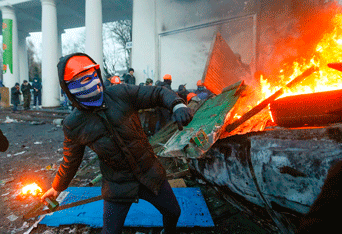2.1.2 Politics as conflict resolution
A second definition of politics goes some way towards ameliorating this problem. It removes the state as the focus of politics and defines politics as a particular kind of process. Politics, in this definition, is a particular method for resolving conflict. Among the best-known proponents of such an understanding of politics was the political scientist Bernard Crick (1929–2008). Crick defines politics as ‘the activity by which differing interests within a given unit of rule are conciliated by giving them a share in power in proportion to their importance to the welfare and the survival of the whole community’ (Crick, 1964, p. 21). Later on he defines politics even more broadly, suggesting that politics is a ‘solution to the problem of order which chooses conciliation rather than violence or coercion’ (p. 30).

One important aspect of Crick’s definitions is the distinction he draws between politics and violence or coercion. For Crick, politics is, by definition, distinct from violence. He is by no means alone in drawing this distinction. Hannah Arendt (1906–1975), another influential political theorist, likewise insisted on the distinction between politics and violence. The association of politics with non-violent conflict resolution is also present in everyday language. A ‘political solution’ to a problem – such as the territorial dispute between India and Pakistan in Kashmir, or the Libyan Civil War of 2011 – is one that involves peaceful negotiation and arbitration; by contrast, a ‘military solution’ implies the use of force. Using this definition, politics is not necessarily related to a particular object – as in the first definition we looked at, politics is that which concerns the state – but refers to the process by which problems are solved and decisions are made.
Although a definition of politics as a way of problem solving that is distinct from violence does not necessarily imply that it takes the form of party politics, Crick’s other work, and perhaps his personal involvement in British party politics, have led to criticism that he is indeed biased towards party politics (Heywood, 2013). One might perceive a hint of this bias in the first of Crick’s definitions above – in his focus on proportional power sharing, for instance. Thus, for some, Crick’s interpretation of politics is still too narrowly focused, if not on the state as such, then on a particular kind of political process – one closely related to pluralist democracies and having little relevance in non-democratic or non-pluralist contexts where, as critics might argue, politics is still present.
There is another challenge that proponents of a broader definition of politics could level at Crick’s definition. Are politics and violence mutually exclusive? Or does the rigid separation of politics from violence (and, perhaps even more so, from coercion) exclude a whole host of actions that should be included under the rubric of the political? Is the destruction of property – anti-capitalist protesters smashing bank machines or animal rights activists throwing paint on expensive fur coats – political? Are suicide bombers acting politically? Or are they engaging in violence, pure and simple, entirely eschewing the political process? Are revolutions – generally defined by their violent character – political? For those for whom politics is a non-violent method of conflict resolution, these would probably not qualify as political actions. Yet for many others, the distinction between politics and violence is a lot less straightforward.
An even more fundamental problem raised by the above discussion is that of definition. We might ask, for instance, what constitutes violence or, for that matter, coercion? Does the destruction of property constitute violence? Is verbal or psychological abuse violent? At what point does exerting pressure on someone become coercion or violence? These are all contentious questions, which elicit contentious (and contested) answers. We will attend more closely to the contestability of concepts later on. Yet it is important to flag it here, as the conceptual choices we make – between different definitions of violence or politics, for instance – determine how we interpret the world around us.
If we keep moving from the narrow towards the broad side of the spectrum, the political scientist Andrew Heywood offers a somewhat broader definition of politics. He defines politics as the ‘activity through which people make, preserve and amend the general rules under which they live’ (Heywood, 2013, p. 2). He goes on to characterise politics as a process of conflict resolution, whereby an attempt is made to reconcile rival interests. Although, in the end, the conflict may not be resolved, politics is characterised by a search for such resolution. With its focus on conflict resolution, this definition shares some commonalities with Crick’s, yet there are also some differences. Crick defines politics as a particular way of resolving conflict – the proportional sharing of power by different interests – and narrows its scope by noting that it takes place ‘within a given unit of rule’ (such as the state). Arguably, Heywood’s definition is broader, extending political activity beyond ‘units of rule’, and defining it as a search for conciliation as opposed to its achievement.

Let’s scrutinise this definition. We might think about what other definitions Heywood’s understanding of politics depends on. Among the most obvious is the definition of conflict (and, by extension, its resolution). We might ask what would qualify as conflict, or its resolution. For instance, would a resolution of conflict necessarily require consensus (or everyone’s agreement on a particular solution) or simply a majority agreement? For some political theorists, politics is (or at least ought to be) a process of consensus building; others see it as more of an adversarial process, where reconciliation and consensus are not necessarily the desired outcome. This leads us to a second, perhaps even more fundamental question we could ask of this (or any other) definition of politics: On what normative (or value) judgements is it premised?
Both Heywood and Crick define politics as a process whose end goal is the reconciliation of differences and the resolution of conflict. Thus, put very simply, it could be argued that the definitions are premised on the assumption that difference and conflict are undesirable, and their reconciliation and resolution desirable. Without explicitly stating it, both Crick and Heywood start from the normative assumption that difference and conflict are ‘bad’ and their mitigation, reconciliation or resolution ‘good’. Therefore, their definitions of politics, although seemingly merely descriptive, are actually built on certain normative assumptions about what is ‘good’ and ‘bad’, ‘desirable’ and ‘undesirable’. This is important to realise, as political analysis is at least in part about unearthing the often implicit, normative assumptions present in political statements and practices.
